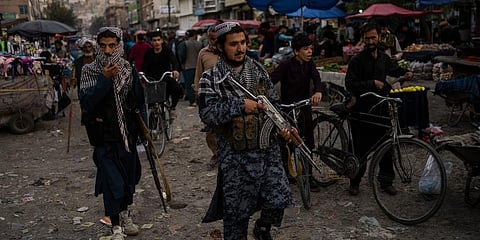

CHAPARHAR: Though the Taliban took control of Afghanistan in mid-August, there are areas that are a no-go zone for them, especially Nangarhar province, which is an Islamic State- Khorasan (ISIS-K) stronghold.
Hollie McKay, an Australian born journalist, who covers news from Afghanistan, writing in knewz said that Chaparhar district of Afghanistan's eastern Nangarhar province, with a population of around 55,000, has long been the base for the terrorist organization (ISIS-K) for brutal attacks nationwide. These have risen to a steady state almost daily, ever since the August 15 Taliban takeover.
It has long been the territorial and operational bastion for Afghanistan's ISIS affiliate known as ISIS-K, or colloquially as Daesh.
"There have been more than 20 dead bodies here since the Taliban came," one villager tells me from outside the gas station. "Just two days ago, a person was shot dead - we don't know by who."
Down a nearby dirt track - where men dig into the earth, and covered women roam with babies in their arms - villagers claim that the number of slaughtered is actually more than 45. Several people vow that almost every day a man is "taken out of his house and killed," reported McKay.
"ISIS has been there since the beginning, since 2015," says Samiullah, a house guard who is around 23. "But the Taliban is only there during the day. At night, they gather at a base and don't go out. Even the previous government soldiers would only go in the day. So this area has always been theirs."
Meanwhile, the Taliban Governor of Chaparhar reluctantly admitted that there are some ISIS terrorists in the area.
"ISIS are there, a few ISIS," the Chaparhar District Governor, whose name is Ainudin but who is famous as Badrudin, reluctantly admits. "They might be hidden somewhere, but the Taliban has taken over, and we are fully in control."
But the further you drive along the narrow Chaparhar Road away from Jalalabad city, the quieter and more sinister it becomes. The Taliban checkpoints disappear, as there is next to no traffic, reported knewz.
Some stores are decorated with a plain black cloth, and others show the black flag printed with the white Shahada, making it impossible to know if it is just a coincidence, or meant the signify the US-designated terrorist faction.
Some point out that years ago, before the ISIS-K rise, Arabs and Chechens started drifting into homes, and it was made clear that the Taliban - then an insurgency - "did not have permission to enter," said McKay.
"ISIS acts as an insurgency. They stay off the main road, but if they have a specific target in mind, they come out from their houses and target that person," one driver explains. "That is how they operate."
Hekmatullah, a baker, swears that the Emirate "has control day and night," and general store owner Haji Khan, 48, cautiously concurs that "nothing is here."
Since ISIS-K's inception into Afghanistan in 2015 - as the outfit gained momentum in its flagship of Iraq and Syria - loyalists have swarmed into the otherwise quiet, picturesque rural parcel.
It is from its bulwark of Chaparhar that ISIS-K for years has plotted, planned and dispatched its cadre of assailants - from suicide bombers and shooters to those who ambush security checkpoints and plant bombs - to take the lives of hundreds, if not thousands, reported knewz.
Much of the uptick of offences has occurred since scores of ISIS-K operatives escaped during the chaotic transition period, with many former security forces abandoning their positions ahead of the Taliban encroachment. But since then, the Taliban themselves have also enabled prison releases.
ISIS-K - sometimes termed the Khorasan group in historical reference to the greater Iranian region meaning "the Eastern Province" in Persian - first surfaced in the Afghan war theatre almost seven years ago.
Most of its recruits are believed to have defected from the Taliban branches in Afghanistan and neighbouring Pakistan, seeking an even more extreme interpretation of Islam with more international rather than domestic-centred goals of "caliphate" control.